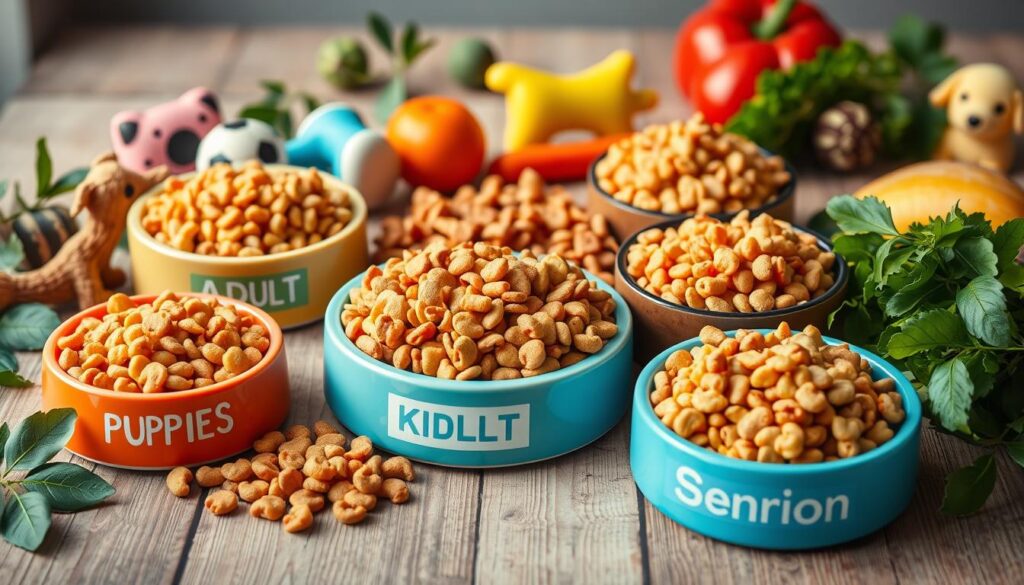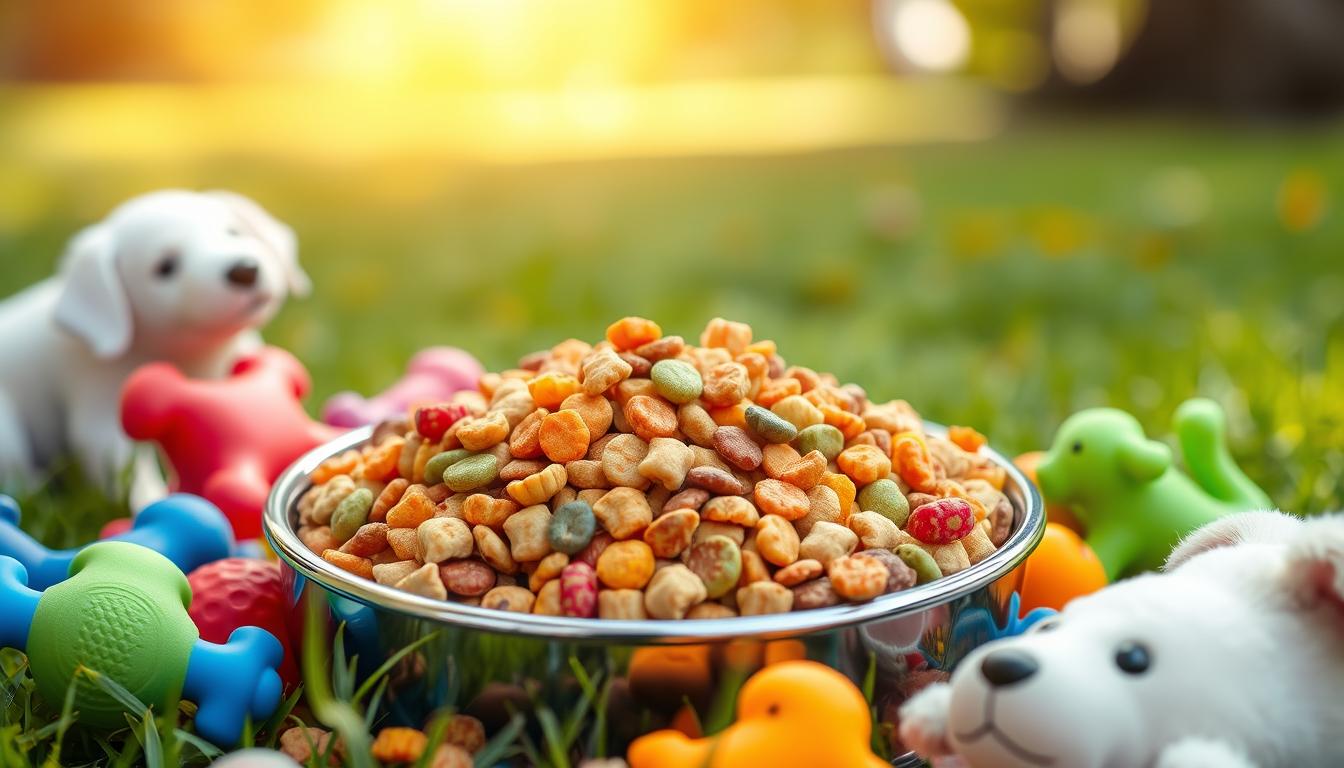I’ve always wanted the best for my dogs, making sure they’re healthy and happy. But, I’ve often wondered if adult dogs can eat puppy food. It’s important to give them the right food for their age and needs.
In this guide, we’ll look at the main differences between puppy and adult dog food. We’ll also talk about the risks of giving puppy food to adult dogs. And, we’ll find out the best times to feed your dog to keep them healthy. This info is great for any dog owner, whether you have a puppy or an older dog.
Let’s start this journey together. We’ll make sure your dog gets the best food for their health and happiness.
Table of Contents
Understanding the Core Differences Between Puppy and Adult Dog Food
There are big differences between puppy and adult dog food. These differences help make sure your dog gets the right food at every age.
Protein and Fat Content Variations
Puppies need more protein, about 22% of their calories, than adult dogs, who need 18%. Puppy food also has more fat, 8.5% of calories, than adult dog food’s 5.5%. This extra protein and fat help puppies grow fast and strong.
Caloric Density Differences
Puppies need more energy than adult dogs. So, puppy food has more calories to keep them active and healthy. This helps them grow well and stay at a good weight.
Essential Nutrient Ratios
Puppy food has more calcium and phosphorus for strong bones and muscles. It also has more DHA, an omega-3 fatty acid, for brain and eye health. Adult dog food focuses on keeping them healthy overall.
Knowing the differences between puppy and adult dog food is key. It helps your dog get the right food at every age. This supports their growth, health, and well-being.
When picking pet food, check the pet food labels carefully. Make sure it matches your dog’s age and needs.
Can Adult Dogs Eat Puppy Food: The Simple Truth
Adult dogs can sometimes eat puppy food without harm. But, it should not be their main food. Puppy food has lots of calories and nutrients, which can cause weight gain and health problems in adult dogs. It can lead to obesity, nutrient imbalances, and stress on organs like the kidneys.
It’s key to give age-appropriate nutrition to keep dogs healthy at all life stages.
Small-breed puppies grow up by 9 months, while large-breed puppies take 15 to 24 months. The nutritional needs of can adult dogs eat puppy food and dog age-appropriate food are very different. It’s important to switch your dog to adult food at the right time.
- Small-breed dogs weigh less than 20 pounds, while large-breed dogs weigh 20 pounds and up.
- Puppy feeding guideline: four feedings per day.
- Transition from puppy food to adult food for small breeds at 7 to 9 months, and for larger breeds at 12 to 14 months.
Puppy food is made for growing pups, with more protein, fat, and nutrients. Adult dogs can have puppy food sometimes, but it should not be their main food. Giving the right dog age-appropriate food is vital for your dog’s health and happiness.
Nutritional Requirements Through Different Life Stages
Dog food needs change as dogs grow. Puppies, adult dogs, and seniors have different needs. Knowing these helps keep your dog healthy and happy.
Puppy Growth Phase Needs
Puppies need more protein and fat for fast growth. The AAFCO says puppy food should have 22% protein and 8.5% fat. They should eat wet food three to four times a day until they’re about 10 weeks old.
Small puppies eat one to three cups of food daily. Big puppies might need up to nine cups, spread over several meals.
Adult Maintenance Requirements
Adult dogs need a balanced diet for maintenance. Their food should have about 18% protein and 5% fat. They usually eat one to two meals a day, depending on their size.
Senior Dog Considerations
Senior dogs need a special diet. They should eat less and have food that’s easier to digest. Senior food helps with joint health and overall wellness.
Switching from puppy to adult food is important. Small breeds usually make the switch at 9-12 months. Big breeds might need puppy food for up to 24 months. Paying attention to your dog’s needs ensures they get the right food.
| Nutrient | Puppy Food | Adult Dog Food | Senior Dog Food |
|---|---|---|---|
| Protein | 22% | 18% | Reduced |
| Fat | 8.5% | 5% | Reduced |
| Calories | Higher | Moderate | Lower |
| Nutrient Focus | Growth & Development | Maintenance | Joint Health, Aging |
The Risks of Feeding Puppy Food to Adult Dogs
Puppy food might seem like an easy choice for adult dogs. But, it’s not always the best option. Puppy food is made for young dogs’ fast growth, not for adult dogs’ needs.
Feeding adult dogs puppy food can make them gain weight. Puppy food has more calories than adult dog food. This can lead to obesity and health issues.
Puppy food also has more protein, fat, calcium, and phosphorus. These can harm older dogs’ kidneys. Too much calcium and phosphorus can cause bone and blood vessel problems.
Long-term, puppy food can cause nutrient imbalances in adult dogs. Look for dog food with AAFCO statements on the label. This ensures your dog gets the right nutrients.
Adult dogs should usually eat a maintenance diet. Choose food based on their age, breed, size, and activity level. This ensures they get the nutrients they need.

Key Components of Puppy Food Formulations
Feeding our furry friends right is key. Puppy food meets their fast growth needs. It’s different from adult dog food.
Protein and Amino Acids
Puppies need more protein and amino acids for muscle and tissue growth. Puppy food has about 22% protein. Adult dog food has around 18%, as the AAFCO says.
Calcium and Phosphorus Levels
Puppy food has more calcium and phosphorus for bone growth. The right mix of these minerals is essential for their bones.
Essential Fatty Acids
Puppy food includes essential fatty acids like DHA for brain and eye development. These fats are crucial for young dogs’ brain and eye growth.
Knowing what’s in puppy food helps pet owners give their dogs the best nutrition. A good puppy food sets them up for a healthy life.
Proper Feeding Schedules for Different Life Stages
It’s important to feed your dog the right amount at the right time. This is key for their health and happiness. The schedule changes based on their age and life stage.
Puppies under 6 months need to eat 3-4 times a day. This helps them grow fast. When they get to 6-12 months, you can switch to 2-3 meals a day. Adult dogs usually do well with 1-2 meals, adjusting for their size and how active they are.
Small puppies (under 20 pounds) eat 1-3 cups of food daily. Medium breeds (20-50 pounds) might need 1-5 cups. Large puppies can eat up to 9 cups. Watching your dog’s weight and adjusting food amounts is crucial to give them the best dog age-appropriate food.
| Life Stage | Feeding Frequency | Portion Size |
|---|---|---|
| Puppies (under 6 months) | 3-4 meals per day | 1-3 cups (small breeds), 1-5 cups (medium breeds), up to 9 cups (large breeds) |
| Puppies (6-12 months) | 2-3 meals per day | 1-3 cups (small breeds), 1-5 cups (medium breeds), up to 9 cups (large breeds) |
| Adult Dogs | 1-2 meals per day | Varies based on size, breed, and activity level |
Adjusting the feeding adult dogs schedule is sometimes needed. This could be due to health issues or special diets. Keeping an eye on their weight and energy helps find the best feeding plan for your dog.

When Puppy Food Might Be Appropriate for Adult Dogs
Adult dogs usually need a diet that matches their specific needs. But, there are times when puppy food is okay for grown dogs. Let’s look at when it’s right to use puppy food for adult dogs.
Pregnant and Nursing Dogs
Pregnant and nursing dogs need more nutrients. They help their puppies grow and keep their energy up. Puppy food is good for them because it has more protein, fat, and nutrients.
Weight Management Cases
Some adult dogs have trouble with their weight. They might be too skinny or not getting enough nutrients. Puppy food can help them gain weight and get healthy again. It has more calories and nutrients for them.
But, always talk to a vet before changing your dog’s diet. Eating puppy food for too long can harm their health. A vet can help make sure your dog stays healthy.
| Puppy Food | Adult Dog Food |
|---|---|
| Higher in calories, protein, and fat to support rapid growth | Lower in calories, protein, and fat for adult maintenance |
| Increased levels of calcium and phosphorus | Balanced calcium and phosphorus levels |
| Designed for puppies and young dogs under 1 year | Formulated for adult dogs 1 year and older |
Transitioning from Puppy to Adult Dog Food
Switching your dog from puppy to adult food is a big step. It helps avoid stomach problems and makes sure they get the right nutrients. The exact time to switch depends on your dog’s size.
Small breeds (4-20 pounds) should start adult food between 6-9 months. Medium breeds (20-50 pounds) can switch around 12-16 months. Large breeds (50-80 pounds) should transition between 18-24 months. Giant breeds (80+ pounds) are best to switch at about 24 months.
- Begin by mixing a little adult food with puppy food. Slowly add more adult food and less puppy food over 10-14 days.
- Puppies, especially small ones, between four and six months, should eat three to four times a day. Adult dogs usually eat twice a day, getting half of their daily calories in each meal.
- Start with 25% adult food and 75% puppy food. Then, increase the adult food over 5-7 days.
This slow change helps your dog’s stomach get used to the new food. It prevents stomach problems. Remember, the right time to switch depends on your dog’s size and the type of food they need.
Understanding AAFCO Guidelines and Pet Food Labels
Choosing the right dog food can be easier with AAFCO guidelines. The Association of American Feed Control Officials (AAFCO) sets standards for pet food. This includes what’s on the labels and how the food is made.
AAFCO labels tell you if the food meets their nutritional standards. They also show if the food has been tested on pets. These labels say if the food is for puppies, adult dogs, or all life stages. Adult dogs usually need a maintenance diet, but your vet might suggest something different.
By looking at these labels and guidelines, you can pick the best food for your dog. This helps keep your dog healthy and happy. Knowing the needs of puppies, adult dogs, and seniors helps you choose the right food for your pet.

